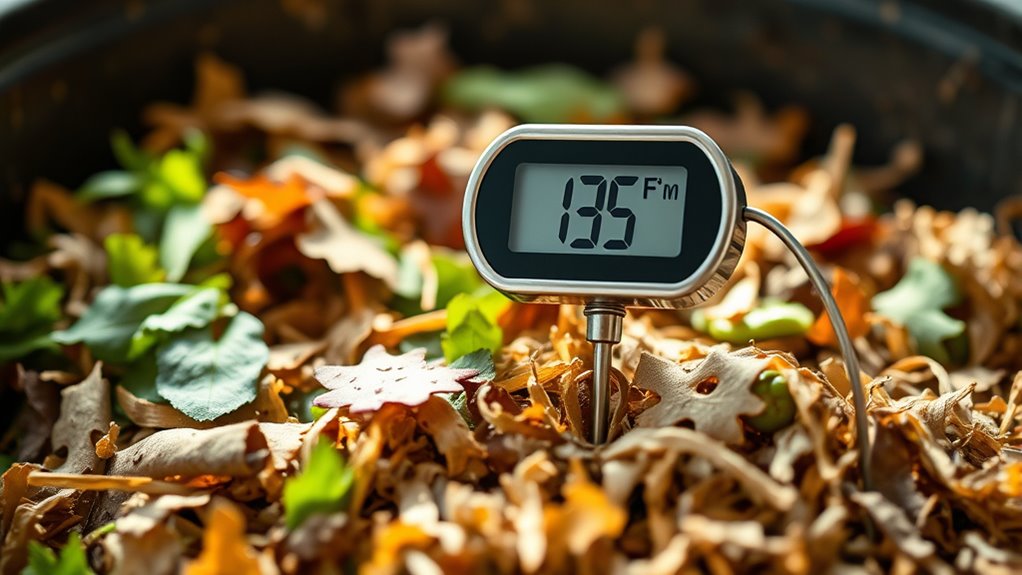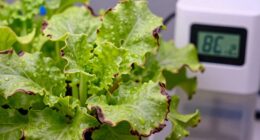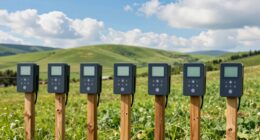To speed up your composting game, I recommend checking out the 15 best compost thermometers designed for durability, accurate readings, and weather resistance. These models often feature long stainless steel stems, large color-coded dials, and waterproof seals, making them perfect for outdoor use. They enable you to monitor core temperatures precisely, ensuring ideal microbial activity and faster composting. Keep exploring to find the perfect thermometer that suits your needs and enhances your composting success.
Key Takeaways
- Look for durable, weather-resistant stainless steel thermometers with long stems (16-36 inches) for accurate deep-core compost temperature readings.
- Choose models with large, easy-to-read dials featuring color-coded zones to quickly assess compost activity stages.
- Prioritize hermetically sealed, waterproof designs that resist fogging and moisture, ensuring long-term outdoor durability.
- Opt for analog thermometers without batteries for reliable, maintenance-free operation and rapid temperature response.
- Consider calibration guides and maintenance ease to keep measurements accurate and speed up composting efficiency.
Reotemp 20 Inch Fahrenheit Backyard Compost Thermometer
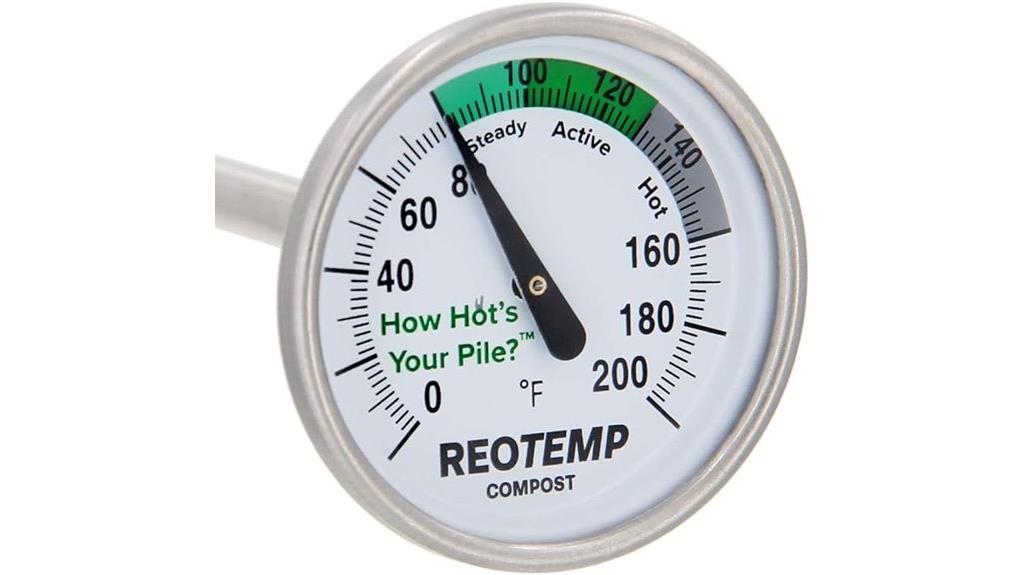
If you’re new to composting and want a reliable thermometer that’s easy to use, the Reotemp 20 Inch Fahrenheit Backyard Compost Thermometer is an excellent choice. I appreciate its sturdy, stainless steel stem that’s 20 inches long, making it simple to monitor deep inside your pile. The dial clearly shows three temperature zones, helping me quickly assess compost activity. Since Reotemp has been making accurate thermometers since 1965, I trust its durability and precision. Plus, the eco-friendly packaging and included expert guide make starting and managing my compost effortless, even as a beginner.
Best For: beginners and backyard composters seeking a durable, easy-to-read thermometer to monitor compost activity effectively.
Pros:
- Sturdy 20-inch stainless steel stem for easy access to deep compost layers
- Clear dial with three temperature zones for quick assessment
- Eco-friendly packaging and included expert guide facilitate beginner composting
Cons:
- May be too long for small or limited space compost bins
- Dial readability could be affected by extreme weather conditions
- Designed primarily for outdoor use, less suitable for indoor composting setups
Reotemp 16 Inch Fahrenheit Backyard Compost Thermometer
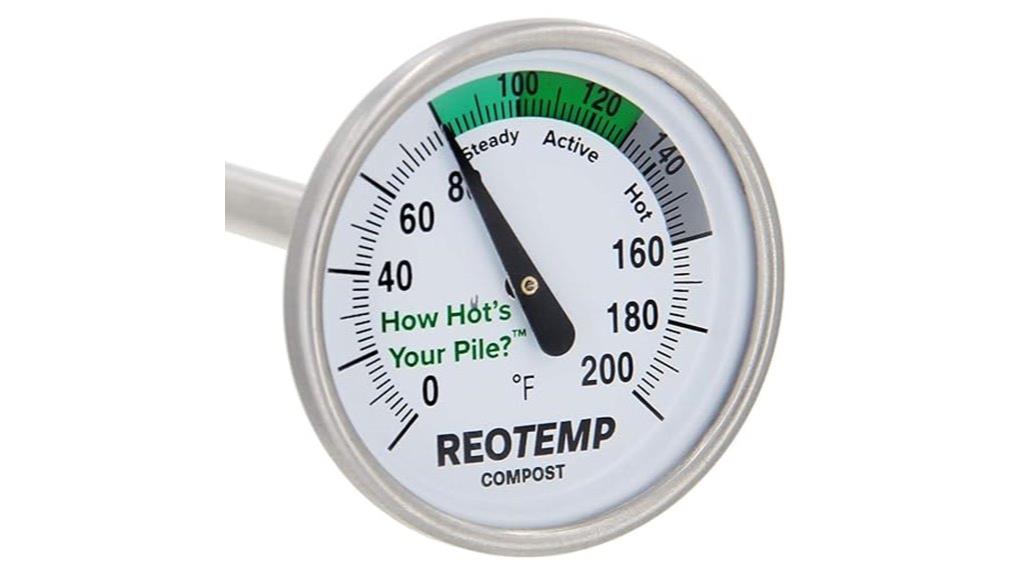
The Reotemp 16 Inch Fahrenheit Backyard Compost Thermometer stands out as a top choice for both beginner and experienced composters who want accurate, deep temperature monitoring. Its 16-inch stainless steel stem allows me to measure deep into my compost pile, providing reliable readings that help me understand the activity level. The hermetically sealed dial prevents fogging, ensuring durability even in outdoor conditions. With clear zones indicating hot, warm, and cool temperatures, I can easily decide when to turn or adjust my pile. Plus, it comes with a free digital guide, making it easier to optimize composting and speed up decomposition.
Best For: both novice and experienced gardeners looking for accurate, deep temperature monitoring to optimize composting efficiency.
Pros:
- Durable stainless steel construction with hermetically sealed dial for outdoor use
- Deep 16-inch stem allows precise measurement of compost core temperatures
- Easy-to-read dial with clear zones helps quickly assess compost activity levels
Cons:
- May be too long for small or shallow compost piles
- Requires manual reading; lacks digital or automated features
- Can be affected by extreme weather conditions if not properly maintained
Greenco Compost Soil Thermometer with 20-Inch Stem

For gardeners and compost enthusiasts who need precise temperature readings from deep within large piles, the Greenco Compost Soil Thermometer with its 20-inch stem stands out as an excellent choice. Made from durable 304 stainless steel, it features a clear, easy-to-read 2-inch dial with color-coded temperature ranges from 40°F to 180°F. The hermetically sealed lens resists fog and moisture, ensuring long-lasting accuracy. With a quick response time of 500 milliseconds, it’s perfect for monitoring compost core temperatures. Its long stem allows you to reach deep into your pile, helping you optimize microbial activity and speed up composting effectively.
Best For: gardeners and compost enthusiasts who require accurate, deep internal temperature readings of large compost piles to optimize microbial activity and composting efficiency.
Pros:
- Long 20-inch stainless steel stem allows for easy measurement deep within large compost piles.
- Durable 304 stainless steel construction resists corrosion and harsh outdoor conditions.
- Clear, easy-to-read 2-inch dial with color-coded temperature ranges for quick assessment.
Cons:
- Some users report minor fluctuations in temperature readings of about 7–10°F, which may affect precision.
- Limited online presence of the manufacturer makes warranty registration and support somewhat difficult.
- Price may be higher compared to smaller or less durable compost thermometers, depending on the retailer.
Reotemp K83B1 12 Inch Soil & Compost Thermometer
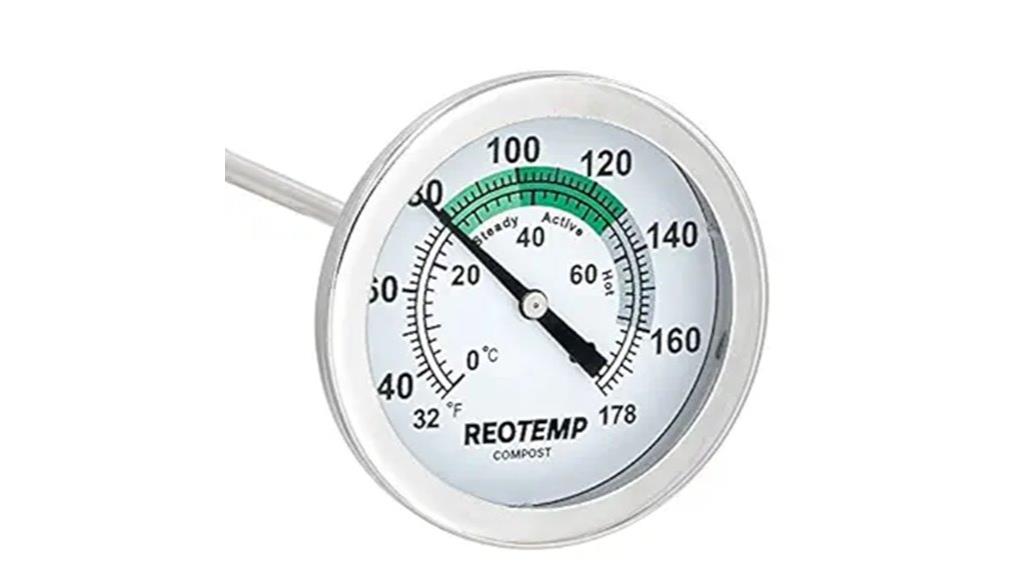
The Reotemp K83B1 12-inch Soil & Compost Thermometer stands out as an excellent choice for beginner gardeners and composters thanks to its durable construction and accurate readings. Its 12-inch stainless steel stem lets me easily test soil and compost depths of 8-10 inches, providing quick, reliable temperature data. Made with corrosion-resistant materials, it’s waterproof and dust-proof, ensuring longevity. The hermetically sealed design prevents fogging after rinsing. Plus, it includes a free digital composting guide with expert tips, making it even more useful for those new to composting. After initial calibration, I find it consistently accurate and durable for ongoing garden and compost management.
Best For: beginner gardeners and composters seeking a durable, accurate, and easy-to-use soil and compost thermometer for small gardening projects and soil testing.
Pros:
- Durable construction with corrosion-resistant 304 stainless steel for long-lasting use
- Quick and reliable temperature readings at depths of 8-10 inches
- Waterproof and dust-proof hermetically sealed design for easy rinsing and maintenance
Cons:
- May require initial calibration for optimal accuracy
- Slight temperature discrepancies reported by some users initially
- Designed primarily for small compost piles and garden beds, not large-scale applications
Compost Thermometer with 16-Inch Stem for Outdoor Soil Testing
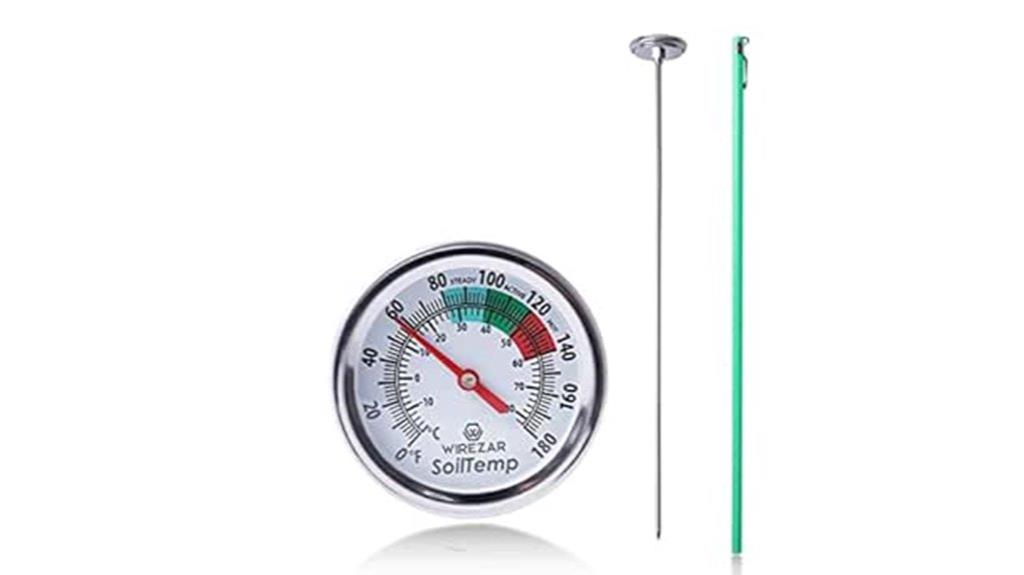
A 16-inch stem makes this compost thermometer an excellent choice for gardeners and farmers who need to monitor soil and compost temperatures deep within their piles. Its durable, all-metal construction with rust-resistant stainless steel ensures long-lasting performance outdoors. The 5-inch probe allows you to reach all areas of your compost or soil, providing accurate readings from 0°F to 180°F. The water-resistant glass face makes cleaning easy, even in muddy conditions. With quick 30-second readings and a color-coded dial, I can easily assess whether my compost is active or overheating, helping me optimize decomposition and soil health efficiently.
Best For: gardeners, farmers, and compost enthusiasts seeking accurate, deep soil and compost temperature monitoring for optimal plant and compost management.
Pros:
- Long 16-inch stem allows measurement of all areas within compost piles or soil beds
- Durable all-metal, rust-resistant stainless steel construction ensures longevity outdoors
- Quick 30-second readings with clear, color-coded dial for easy assessment
Cons:
- Probe is relatively thin, which may be prone to damage if handled roughly or used in very hard soil
- Not suitable for extremely hard or compacted soil to avoid bending or breaking the probe
- Requires cleaning after each use to maintain accuracy and prevent buildup
VIVOSUN Compost Thermometer (20 Inch)
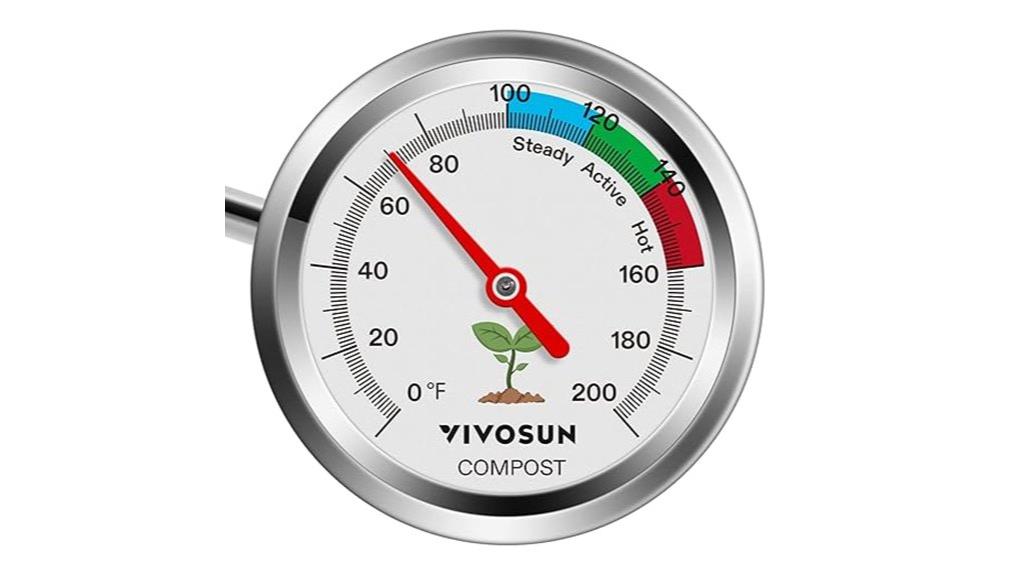
If you need a durable, long-length thermometer to monitor large compost piles accurately, the VIVOSUN 20-inch Compost Thermometer stands out. Its 19.7-inch stainless steel stem and rugged design ensure it can handle extensive compost heaps. The waterproof IP55 lens keeps readings clear, even in moist environments. With a temperature range from 0°F to 200°F and three color zones, it helps easily identify composting stages—steady, active, and hot. The ±2°F accuracy makes it reliable for precise monitoring. Though assembly can be tricky, once in place, it provides long-lasting, fog-free readings, making it a valuable tool for serious composters.
Best For: gardeners and composters managing large or extensive compost piles who need a durable, accurate thermometer to monitor temperature stages effectively.
Pros:
- Long 20-inch stainless steel stem for measuring large compost heaps
- Waterproof IP55 lens ensures clear readings in moist environments
- Accurate ±2°F readings help optimize composting process
Cons:
- Assembly can be difficult and time-consuming for some users
- Handling carefully is required to avoid damaging the thermometer during use
- Sliding doors of compost chambers may be hard to operate, complicating management
Compost Soil Worm Thermometer with Waterproof Probe
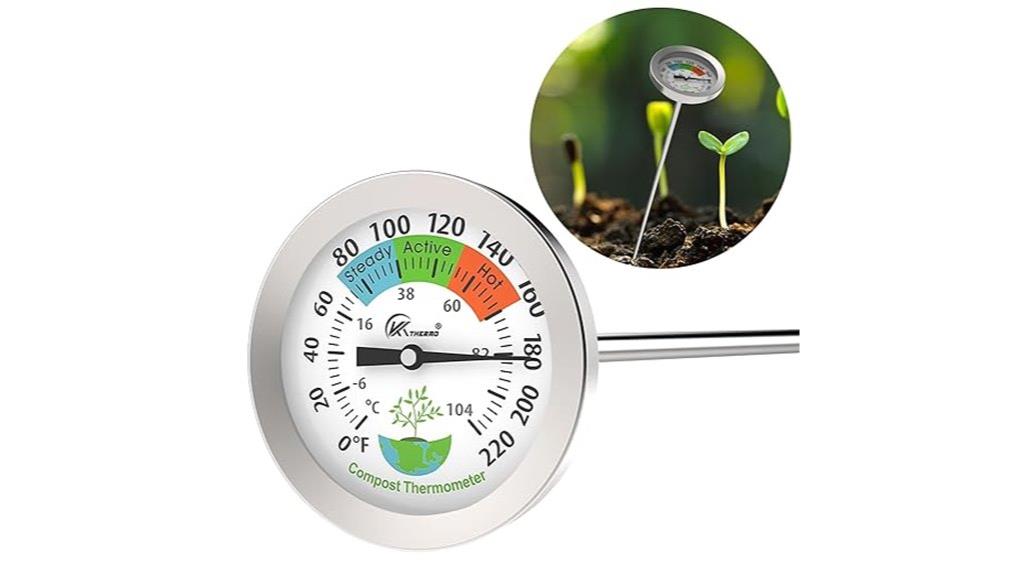
Compost Soil Worm Thermometers with waterproof probes are ideal for gardeners who need reliable, deep-reaching temperature readings in outdoor compost piles and worm bins. Their 20-inch long stems allow you to accurately measure temperature at various depths, ensuring your compost stays within ideal ranges. The large, easy-to-read dial with colored zones helps you quickly identify whether your compost is active or needs attention. Made from durable stainless steel, the waterproof casing withstands weather and washing. These thermometers are perfect for both beginners and seasoned gardeners, helping you maximize composting conditions, speed up decomposition, and produce high-quality compost efficiently.
Best For: gardeners and compost enthusiasts seeking accurate, deep-temperature readings to optimize compost health and accelerate decomposition processes.
Pros:
- Equipped with a 20-inch waterproof probe for precise measurements at various depths.
- Durable stainless steel casing resistant to rust and weather conditions.
- Large, easy-to-read dial with color-coded zones for quick temperature assessment.
Cons:
- Some users have reported water intrusion issues affecting durability.
- Occasional product defects such as broken dials or parts falling out.
- Price may be higher compared to basic thermometers without waterproof features.
Compost Thermometer for Backyard Composting
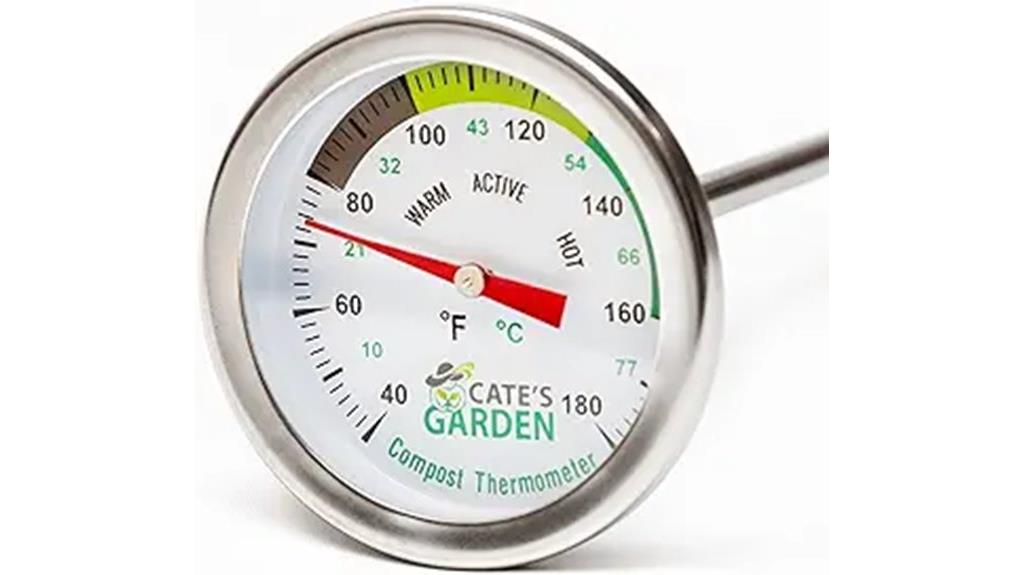
For backyard composters seeking accurate and reliable temperature monitoring, the Cates Garden Premium Stainless Steel Compost Thermometer stands out with its quick 30-second response time and long 20-inch probe. Its sturdy stainless steel construction resists harsh outdoor conditions, and the analog dial features both Fahrenheit and Celsius scales for easy reading. The thermometer measures ambient and compost temperatures within 1-2°F, helping you track microbial activity and ensure proper composting. Its color-coded dial highlights key temperature ranges, making it simple to identify when your compost reaches thermophilic levels. Overall, it’s a durable, precise tool that accelerates composting and improves compost quality.
Best For: backyard composters and organic gardeners seeking quick, accurate temperature readings to optimize composting efficiency.
Pros:
- Fast response time of approximately 30 seconds for quick monitoring
- Durable stainless steel construction resists harsh outdoor conditions
- Clear, color-coded dial makes temperature ranges easy to identify
Cons:
- Limited upper temperature rating of 82°C (179.6°F), not suitable for extremely high heat applications
- Can be slightly heavy at 2.8 ounces, which may affect handling over long periods
- Requires proper storage and cleaning to maintain accuracy and longevity
Reotemp 36 Inch Backyard Compost Thermometer
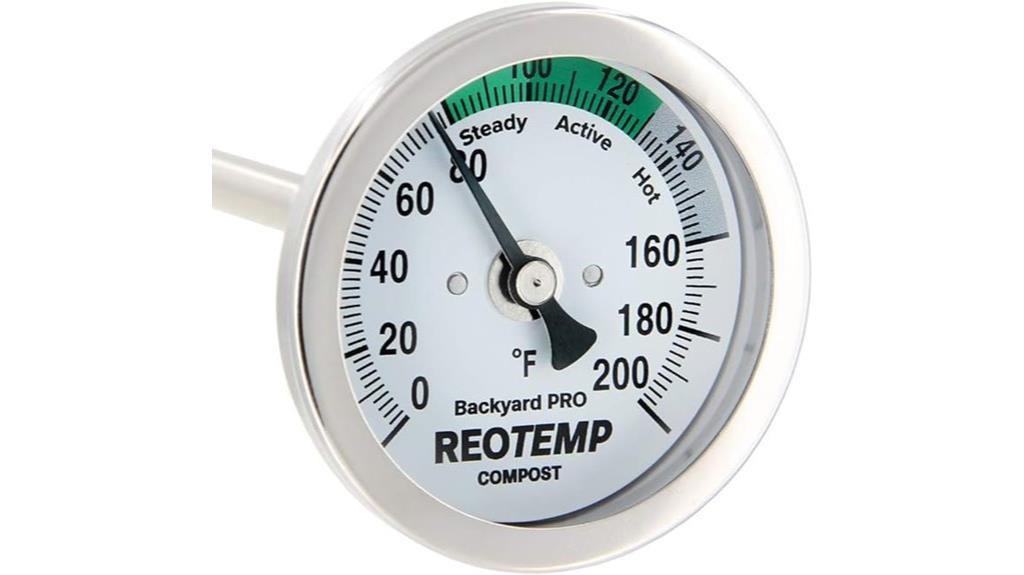
The Reotemp 36 Inch Backyard Compost Thermometer stands out with its rugged all stainless steel construction and a 24-inch stem, making it ideal for serious compost enthusiasts who need accurate, deep temperature readings. Its heavy-duty 5/16-inch stem guarantees durability and easy insertion into thick compost piles. The thermometer features a hermetically sealed dial that prevents fogging, so you get clear, reliable readings every time. With a 3-zone dial indicating Steady, Active, and Hot compost states, it helps you monitor and optimize your composting process. Plus, the included digital compost guide offers expert instructions, making it easier to produce high-quality compost efficiently.
Best For: serious compost enthusiasts and outdoor gardeners who require accurate, deep temperature readings to optimize their composting process.
Pros:
- Rugged all stainless steel construction ensures durability and longevity.
- 24-inch stem allows for accurate deep placement in compost piles.
- Hermetically sealed dial prevents fogging, providing clear readings in all weather conditions.
Cons:
- May be too large or heavy for casual or small-scale composting setups.
- Requires careful handling to avoid damaging the heavy-duty stem.
- Does not include a built-in digital readout; relies solely on the analog dial for temperature measurement.
Reotemp 24-Inch Fahrenheit Backyard Pro Compost Thermometer
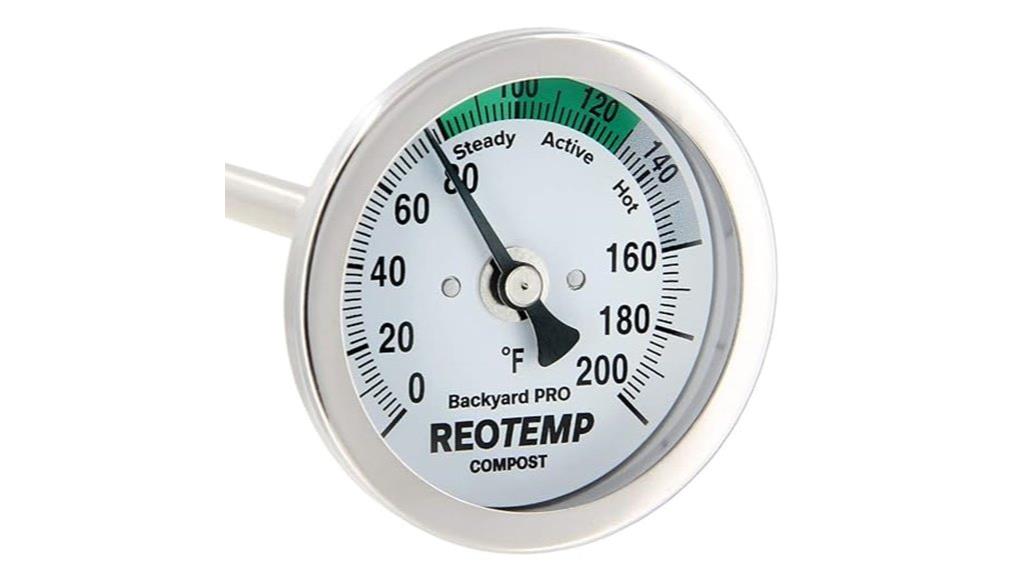
If you’re managing large or deep compost piles, the Reotemp 24-Inch Fahrenheit Backyard Pro Compost Thermometer is an excellent choice because of its rugged all stainless steel construction and extended 24-inch stem. Its heavy-duty stem easily probes deep into sizable piles, giving you accurate readings of the core temperature. The large, easy-to-read dial displays three zones—Steady, Active, Hot—so you can quickly assess compost activity. Built to withstand harsh conditions, it features a sealed glass lens for fog-free monitoring and adjustable calibration for precision. This thermometer helps me track temperature changes effectively, promoting faster composting and preventing issues like overheating or spoilage.
Best For: composters managing large, deep, or heavy-duty piles who need accurate, long-lasting temperature monitoring.
Pros:
- Rugged all stainless steel construction ensures durability and longevity.
- Extended 24-inch stem allows deep probing into large compost heaps.
- Large, easy-to-read dial with color-coded zones for quick activity assessment.
Cons:
- May be more expensive than smaller or less durable thermometers.
- Requires calibration for optimal accuracy, which can be slightly technical.
- Heavy-duty design might be cumbersome for very small or shallow compost piles.
Compost Thermometer with Soil Temperature Guide
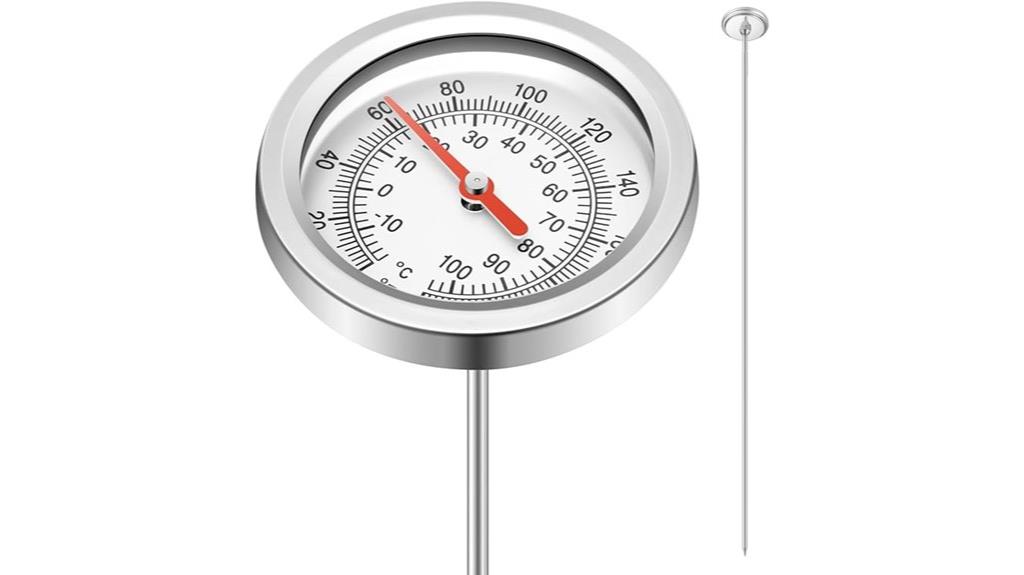
A compost thermometer with a soil temperature guide is essential for anyone serious about maintaining ideal compost conditions. Its extendable stainless steel stem, about 39.4 inches long, allows me to reach deep into the pile for precise readings of the internal temperature. The durable construction, with a 0.16-inch thick stem and welded bolts, guarantees it withstands outdoor use over time. I get quick, accurate measurements within 30 seconds, helping me monitor and adjust compost conditions effectively. The waterproof, weather-resistant design means I can leave it in the pile overnight without worry. This practical tool makes managing compost health simple and reliable for better garden results.
Best For: DIY gardeners and composters who need accurate, deep soil temperature readings to optimize composting and gardening practices.
Pros:
- Extendable stainless steel stem allows for deep penetration into compost piles for precise measurements
- Fast, accurate readings within approximately 30 seconds help in timely decision-making
- Waterproof and weather-resistant design ensures durability and reliable performance outdoors
Cons:
- The long stem may be cumbersome to handle for casual or small-scale gardening
- Requires manual reading and interpretation, which may be challenging for beginners
- No digital display or additional features, limiting multifunctionality
Compost Soil Thermometer Waterproof Soil Temperature Thermometer
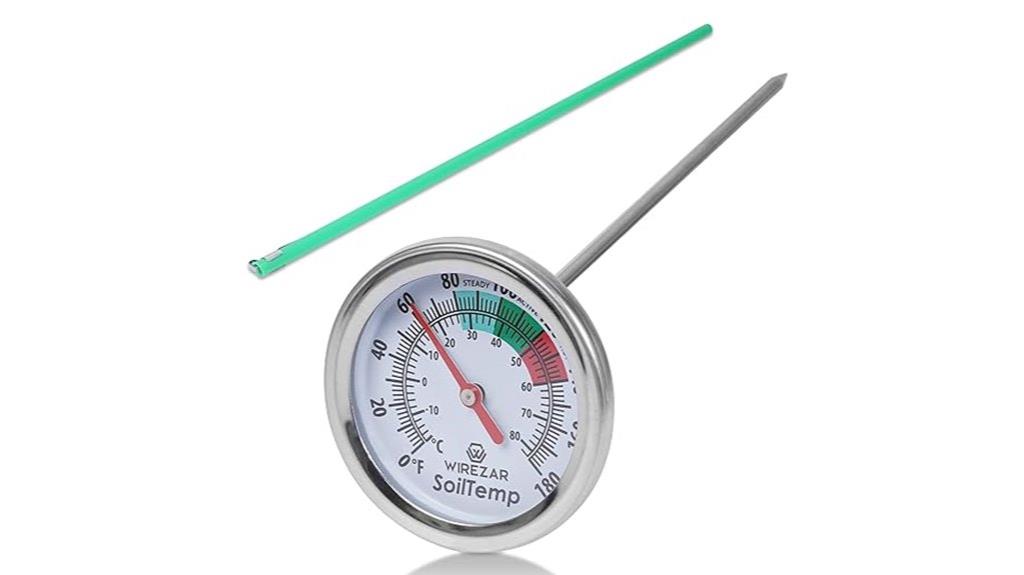
For gardeners and composters needing a reliable, waterproof soil thermometer, this compost soil thermometer with a stainless steel stem stands out. Its 16-inch stainless steel probe is durable, rust-resistant, and designed for outdoor use. The large, easy-to-read dial lets you quickly monitor soil and compost temperatures, essential for preventing overheating and ensuring proper decomposition. It penetrates deep into compost piles, providing accurate readings at the core. While generally accurate, calibration may be needed for precise measurements. Users praise its sturdiness and ease of use, making it a trusted tool for maintaining ideal compost and soil conditions in any weather.
Best For: gardeners and composters seeking a durable, waterproof soil thermometer to monitor soil and compost temperatures accurately outdoors.
Pros:
- Made with a 16-inch stainless steel stem that is rust-resistant and durable for outdoor use
- Large, easy-to-read dial for quick temperature readings in various conditions
- Penetrates deeply into compost piles for accurate core temperature measurement
Cons:
- Calibration may be necessary for precise readings, but instructions are not provided
- No composting or gardening guidance included with the thermometer
- Some users may find calibration adjustments challenging without clear instructions
Backyard Compost Thermometer with Stainless Steel Stem
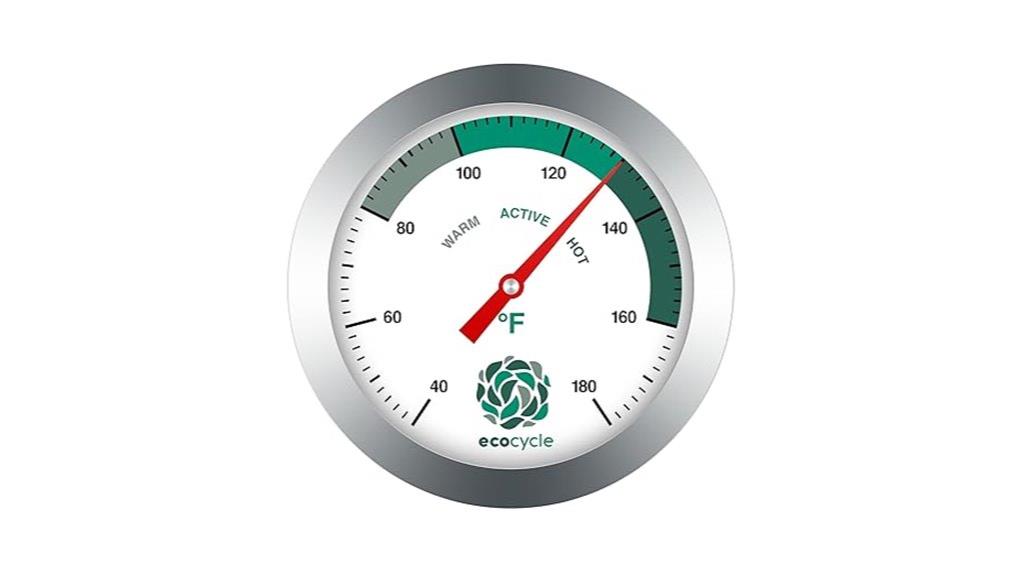
The Backyard Compost Thermometer with Stainless Steel Stem stands out for its long, 20-inch stem, making it ideal for larger compost piles where accurate temperature readings are essential. Its hermetically sealed waterproof anti-fog lens allows for overnight placement without fogging, while the thick 6mm stainless steel stem guarantees durability and resistance to bending or breaking. It measures temperatures between 40-180°F with 2°F increments, featuring color-coded zones for quick assessment. The large, easy-to-read dial simplifies monitoring, and the quick 30-second readings help me manage my compost effectively. Plus, it comes with a free e-book packed with tips for beginners.
Best For: gardeners and compost enthusiasts managing larger outdoor compost piles who need accurate and durable temperature monitoring tools.
Pros:
- Long 20-inch stainless steel stem provides accurate readings for large compost heaps.
- Waterproof anti-fog lens allows for overnight placement without fogging.
- Durable 6mm thick stem resists bending and breaking over time.
Cons:
- May be too long or bulky for small or indoor compost bins.
- Requires approximately 30 seconds for a temperature reading, which might be longer than digital alternatives.
- Limited temperature range (40-180°F) may not suit all composting environments.
20 Inch Compost Soil Thermometer with 0-180°F Dial for Outdoor Gardening
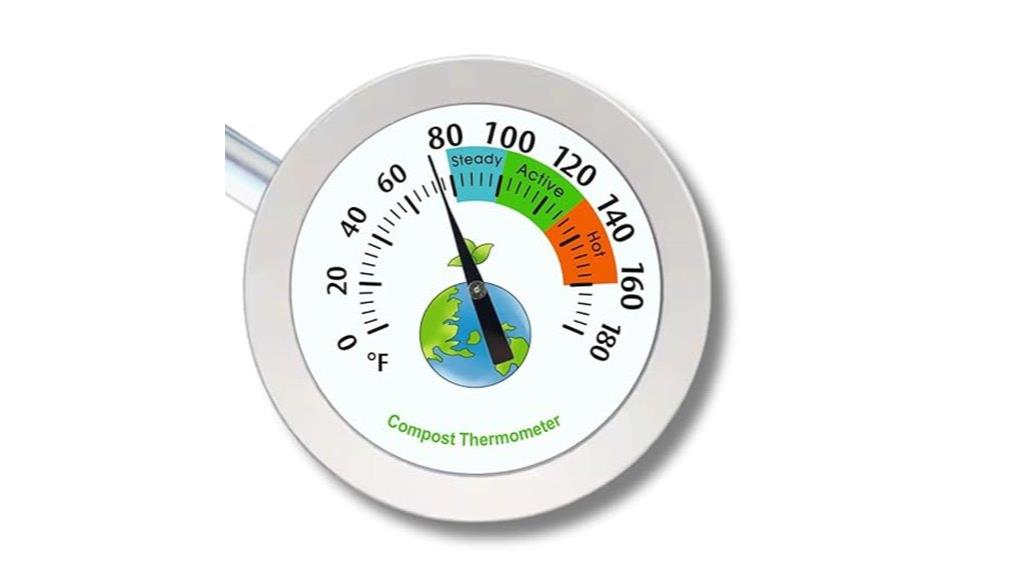
With its 20-inch stainless steel stem, this compost soil thermometer is ideal for gardeners who want deep, accurate temperature readings without hassle. The long probe easily reaches into compost piles, soil, or raised beds, providing precise measurements up to 180°F. Its 2.1-inch dial features clear, color-coded zones—blue for steady, green for active, and orange for hot—so you can quickly assess compost activity. Made from waterproof, rust-resistant stainless steel, it’s durable for outdoor use. No batteries are needed, and it offers instant readings, making it perfect for both beginners and seasoned gardeners aiming to optimize composting and soil health efficiently.
Best For: gardeners and compost enthusiasts seeking a durable, accurate, and easy-to-read thermometer for deep soil and compost temperature monitoring.
Pros:
- Long 20-inch stainless steel stem allows for precise deep interior readings without bending or flexing.
- Clear 2.1-inch dial with color-coded zones provides quick assessment of compost activity levels.
- Waterproof and rust-resistant construction ensures durability for outdoor and indoor use.
Cons:
- Some users report limited moisture resistance, which may cause condensation inside the dial.
- Digital thermometers may offer more precise calibration if highly accurate measurements are required.
- Delivery times may be delayed, sometimes exceeding a month, though product quality remains positive.
Long Stem Compost Soil Thermometer
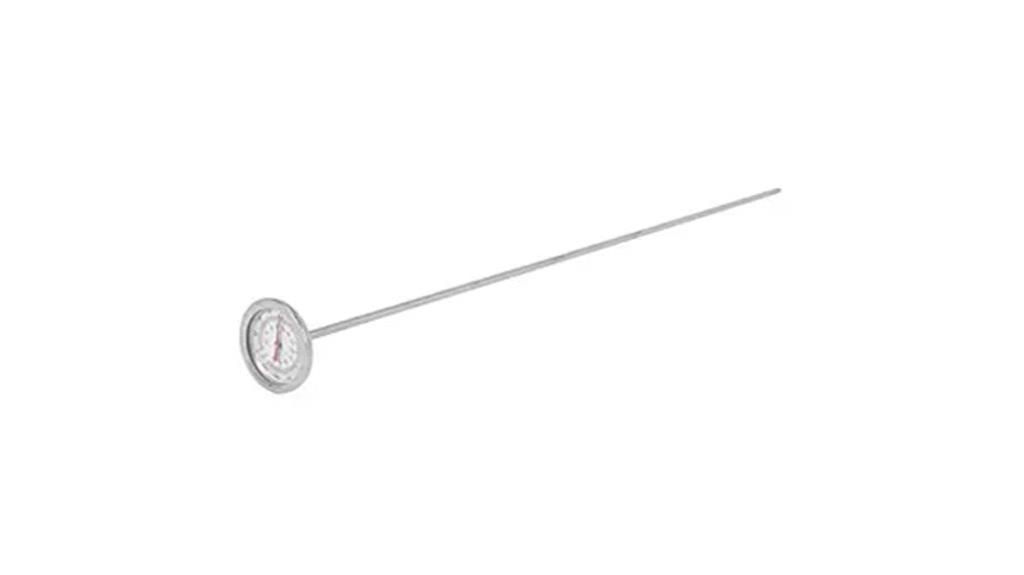
A long stem compost soil thermometer is essential for anyone serious about maintaining ideal compost conditions. Its 20-inch stainless steel probe allows me to reach deep into the pile, ensuring accurate readings of internal temperature. Made from durable, corrosion-resistant material, it’s built to last and withstand outdoor use. The hermetically sealed design prevents fogging and moisture, keeping it reliable over time. With fast response and high accuracy (±1-3cm), I can easily monitor compost temperature to optimize decomposition. No batteries are needed—just insert and read. This simple tool helps me keep my compost at the perfect temperature for faster, healthier composting.
Best For: gardeners, compost enthusiasts, and outdoor landscapers who need accurate, deep soil temperature measurements for optimal composting conditions.
Pros:
- Durable stainless steel construction ensures longevity and resistance to corrosion
- Long 20-inch probe allows for precise measurement deep into compost piles
- Hermetically sealed design prevents fogging and moisture, maintaining accuracy over time
Cons:
- Not suitable for continuous outdoor exposure; should be stored indoors when not in use
- Manual operation without batteries may require more careful handling and calibration
- Slight color variations from images may occur due to display differences
Factors to Consider When Choosing Compost Thermometers
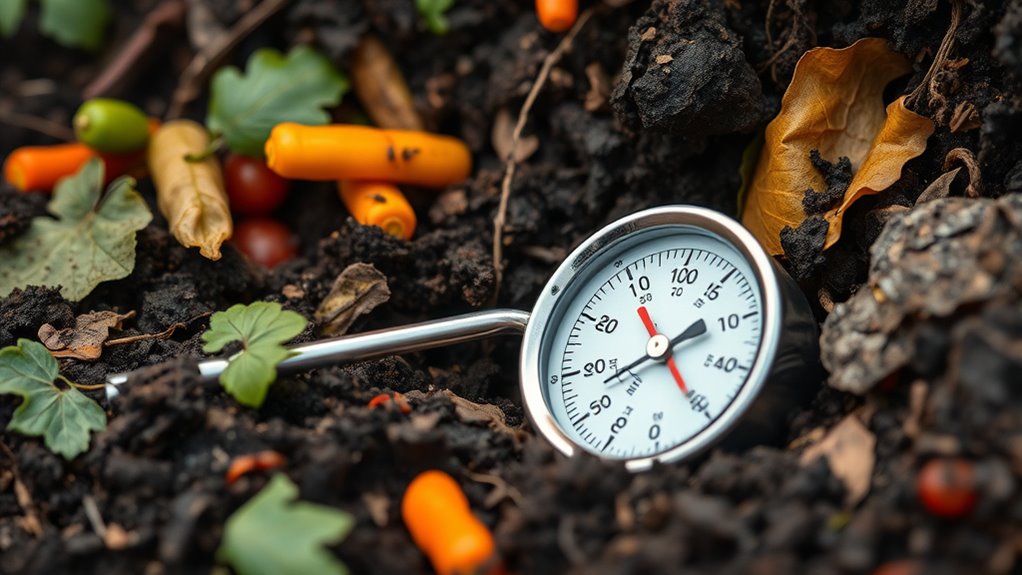
When choosing a compost thermometer, I focus on factors like temperature range and accuracy to guarantee reliable readings. I also consider stem length and durability so the thermometer can reach the right depth and withstand weather conditions. Additionally, I look for easy-to-read displays and weather-resistant materials to make monitoring straightforward and durable.
Temperature Range Accuracy
Selecting a compost thermometer with the right temperature range is essential for accurately monitoring microbial activity throughout the composting process. A good thermometer should cover roughly 40°F to 160°F, capturing the full spectrum of composting stages—from initial warmth to high-temperature pathogen kill zones. Precise readings within 1-2°F are important, helping you maintain ideal conditions and avoid overheating or underheating. A resolution of at least 2°F allows for detailed tracking of temperature fluctuations, giving you better control over the process. Keep in mind, calibration matters—an easy-to-calibrate thermometer ensures consistent accuracy over time. A broad temperature range not only suits different composting phases but also guarantees your thermometer remains useful as your compost pile evolves.
Stem Length and Depth
The length of the stem on a compost thermometer directly impacts how accurately you can gauge the internal temperature of your pile. A longer stem, typically between 16 to 36 inches, allows you to reach the core or center of large or deep compost heaps, giving a more representative temperature reading. Shorter stems work well for small piles or surface testing but may not capture the true temperature of the entire compost. To get an accurate measurement, you should insert the stem about two-thirds to three-quarters into the pile, reaching the active microbial zone. Choosing the right stem length ensures you avoid surface cooling or heating effects and provides a reliable assessment of your compost’s condition.
Material Durability
Choosing a compost thermometer made from durable materials is essential for reliable, long-term use. Materials like stainless steel, especially 304 stainless steel, resist corrosion and stand up well to outdoor conditions. A hermetically sealed design prevents fogging and moisture from ruining the internal components, ensuring accurate readings over time. Thicker stems, typically 5-6mm, add strength, making the thermometer more resistant to bending or breaking when inserted into dense compost. Durable materials also withstand temperature fluctuations, moisture, and physical handling, reducing the need for frequent replacements. Investing in a thermometer with robust construction means it will remain reliable season after season, helping you monitor your compost effectively without constant worry about damage or malfunction.
Ease of Reading
A compost thermometer with easy-to-read features makes monitoring temperature straightforward, even in challenging outdoor conditions. I look for a large dial with clear, high-contrast markings that allow quick assessments at a glance. Color-coded zones are especially helpful, as they instantly show whether my compost is too cold, active, or overheating, without needing to read exact numbers. A responsive needle that moves smoothly and accurately ensures I can trust the readings as the temperature changes. To keep visibility intact regardless of weather, a sealed, fog-resistant lens is essential. Additionally, a clean, legible font and minimal clutter on the dial improve readability, particularly in low-light or muddy environments. These features save time and reduce guesswork during compost monitoring.
Weather Resistance
When selecting a compost thermometer, ensuring it can withstand outdoor weather conditions is essential for long-lasting performance. Look for models made with durable, corrosion-resistant materials like stainless steel or sealed glass, which can handle rain, snow, and varying temperatures. Waterproof or hermetically sealed designs prevent fogging, moisture intrusion, and damage, maintaining accuracy over time. An IP55 or higher water-resistance rating indicates the thermometer can resist water spray and exposure to the elements. UV-resistant and rustproof coatings further protect against sun damage and corrosion, ensuring the thermometer remains functional after prolonged outdoor use. Proper weather resistance not only preserves accuracy but also extends the lifespan of your thermometer, making it a reliable tool for consistent compost monitoring in any weather.
Calibration Needs
Ensuring your compost thermometer is properly calibrated is essential for getting accurate temperature readings, which are indispensable for managing the composting process effectively. Many thermometers need calibration using ice water (32°F or 0°C) to verify accuracy, especially after initial use or storage. Calibration adjustments are usually made with a screw or dial nut, allowing you to correct any discrepancies between actual and displayed temperatures. Regular checks help maintain measurement precision, particularly outdoors where temperature fluctuations are common. An uncalibrated thermometer can give false readings, leading to improper heating, odors, incomplete decomposition, or even safety hazards like spontaneous combustion. Prioritizing calibration needs ensures your thermometer provides reliable data, helping you optimize compost conditions and speed up the process.
Price and Value
Choosing the right compost thermometer involves balancing cost with features and durability. Prices range from about $10 to $50, with higher-end models offering more precise readings, longer stems for deep compost, and better weather resistance. While budget-friendly options are tempting, they often lack durability or accuracy, which can lead to costly replacements over time. Investing in a thermometer with stainless steel construction or hermetically sealed dials can improve longevity and reliability, offering better long-term value. Evaluating the features you need versus what you’re paying for helps ensure you get the best performance for your budget. A slightly higher upfront cost can save you money in the long run by reducing replacements and providing more accurate, consistent readings to speed up your composting process.
Frequently Asked Questions
How Often Should I Check My Compost Temperature?
You might wonder how often to check your compost temperature. I recommend doing it at least once a week to keep everything on track. During active composting, temperatures can fluctuate, so regular checks help you maintain the ideal range of 135-160°F for quick decomposition. If the temperature drops, I add more greens or turn the pile; if it’s too hot, I let it cool down before turning.
What Is the Ideal Temperature Range for Composting?
The ideal temperature range for composting is between 135°F and 160°F. I check mine regularly to guarantee it stays within this range, which helps break down materials quickly and kills off harmful bacteria. If it gets too hot, I turn the pile to cool it down. If it’s too cold, I add more greens or moisture to boost activity. Maintaining this range keeps my compost healthy and efficient.
Can a Compost Thermometer Measure Moisture Levels?
A standard compost thermometer mainly measures temperature, not moisture levels. However, some advanced models combine temperature and moisture sensors, helping you monitor both factors simultaneously. If you’re serious about composting, look for a thermometer with integrated moisture readings or use a separate moisture meter. Keeping an eye on both guarantees your compost stays active and healthy, speeding up the breakdown process and producing rich, nutritious soil.
Are Digital Thermometers More Accurate Than Analog Ones?
Did you know digital thermometers are typically 95% accurate compared to 85% for analog ones? I find digital thermometers more reliable because they give instant readings and are easier to read, especially in low light. While analog thermometers can be durable and simple, I prefer digital ones for their precision and quick results. If you’re serious about composting, a digital thermometer can definitely help you monitor temperature more accurately.
How Does Ambient Weather Affect Compost Temperature Readings?
Ambient weather definitely impacts compost temperature readings. When it’s cold outside, your compost might stay cooler, even if it’s active inside. Conversely, hot weather can boost temperatures, making compost appear hotter than it actually is. I always consider the weather conditions when checking my compost’s temperature, so I get a more accurate sense of whether it’s heating up properly or needs adjustments, regardless of the outdoor climate.
Conclusion
Choosing the right compost thermometer is like finding a trusted compass for your gardening journey. It helps you navigate the perfect temperature zone to speed up composting efficiently. With options ranging from 12 to 20 inches and various features, you can find one that fits your needs. Invest in a good thermometer, and watch your compost transform faster, turning your garden waste into nutrient-rich soil—like magic in your backyard!

